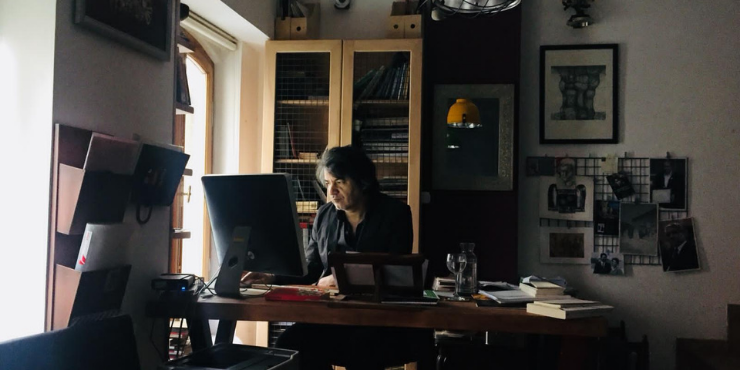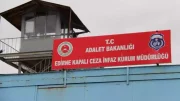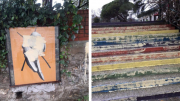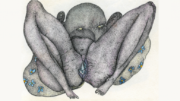SONAY BAN
Avesta Publishing House, one of the pioneers of Kurdish publication in Turkey, has struggled with many prohibitions, obstructions and difficulties since its establishment in 1995 – or rather, it was forced to do so. The latest book ban the publishing house experienced spanned over four years: They published the book Sheri Laizer’s Martyrs, Traitors and Patriots: Kurdistan from the Gulf War to the Present (2007) and were told that the book was banned on 9 November 2017 by Mersin 3rd Criminal Court of Peace. The interesting thing here is that they were notified of the book ban on 2 March 2021, only approximately 3,5 years later. On the Twitter post that they made a statement about the ban it also read that the publication house faced 15 book bans, alone, over the last three years.
We talked with Abdullah Keskin, Editor-in-Chief of Avesta Publishing House regarding various bans on their publications over the last two decades. Our conversation also took us on a tour on how they navigate through book bans, their struggle with overt and invisible censorship practices, and the history of the publishing house.
In your statement, you mentioned that a ban was issued in 2017 for one of the books you published (a book with a nonsuit decision) yet you were only notified of this particular ban in March 2021, 3,5 years later. Do you face these kinds of obstructions/preventions that often? What is your take on the fact that in the recent years, these practices, more often than not, operate through “arbitrariness or uncertainty?”
In the past, this was what was happening: Most of the publishing houses are based in İstanbul -just like ours. Until 2007, the courts where the publication was published were authorized to intervene or rule for banning books. The current trials for book bans have nothing to do with book investigations. These trials are related to other issues, usually about books that are confiscated -by chance- during a house raid or about those who have the words “Kurd” and “Kurdistan” on their covers: And they are usually all banned at the end. They display the books (without reading them) as if the books are “crime weapons.” There are no indications on the legal notifications we receive that the books are read. The police departments ask the prosecutor’s office to ban the books, the office applies to the court and bans the promotion, the distribution, and the display and sales of the books -basically everything. The court decides the worst possible outcome in the first place and they do not even bother notifying us about it.
How did we learn pull offs of our books? In 2018, a bookseller in Van asked us to provide him/her a written notification that one of our books s/he sold was not banned. When we asked the reason, s/he said that the police asked for it. But there will be police records for any interdicts of books. We objected and said, “There is no investigation, let alone an interdict of the said book.” The bookseller insisted and showed us an example from another publishing house: Some time in the past, that publishing house sent to the bookseller a list of book titles (with their letterhead stationery) that do not have interdicts by the police. The whole process was weird, but we did something similar in order not to make a fuss about it. Two or three months later, the police issued a legal notification indicating that nine of our books were banned. Some of our books are found during a house raid of a master’s student in İdil (Şırnak, Turkey). The police confiscated and immediately banned them. Among those banned are books on Yazidi sacred writings (having nothing to do with politics), a research on the Battle of Chaldiran [1514 -between the Ottoman Empire and the Safavid Empire], doctoral theses, or reports on the genocide in Iraq related to the Anfal movement. They were all banned based on the Anti-Terror Law. We appealed and received a foreign plea, thus the decision was sent to a higher court. The interesting thing is that that court is in Şırnak and they were completely unaware of what happened. One incident occurred in Ayvalık [Balıkesir]. At one instance, someone was caught with one of our books on the border on his/her way to Erbil [Iraq], s/he was detained, hence the book was banned. For the other one at the beginning of March 2021 -an investigation began for one of our books in 2007 yet they decided a nonsuit, yet they banned the book in 2017, ten years later. The Press Office called us and told that the book has been on some of the websites (other than ours) although it was banned, thus they wanted us to remove it from these websites. I told them that, first of all, the book is not banned. Second, even if it is banned, we would not say to any websites “do remove our books.” Upon that, the police told me that the book was banned by the Mersin Civil Court of First Instance in 2017. I said that we did not receive any legal notification on the matter and asked for the document. Then, they sent us the notification dated in 2017. There is no trial for us at the moment and we do not know why (based on which section or part of) this book was banned.
So you don’t have a written document at the moment?
No information whatsoever, only guesses. Our book From the Ashes of the Angels centers around mythology (no politics involved or no mention of today’s conditions) yet has a dedication page at the beginning. So, we assume it was banned because of that dedication. In the past, they provided the reasons for the bans with quotations, saying “such and such paragraphs are banned based on such law” but not anymore. When I asked our lawyer about [From the Ashes of Angels] when the trial would take place, s/he said, “there is no trial, this is it!” Sometimes we come together with friends who had similar experiences in the past, and even then, we cannot explain to each other, let alone understand certain practices we are facing right now. (Not that we do such things but) In the past, we witnessed instances where certain publishing houses took off some parts/sections of their books because the said sections were banned. Today, a publisher might think it is a good idea to take a step back a bit and employ censorship, but it has no use at all: Because right now, they ban books that you published 14 years ago [referring to the ban they faced in 2007] or 20 years ago. Interestingly, they did not file any investigation for some books that we published in the last two or three years and thought “this one will definitely be banned” -we are happy they don’t file any investigation but this whole process is weird: What is the point of the publishing houses if we don’t have freedom of expression and of thought? We should not compromise one bit on this issue because it is not something to be compromised.
You mention that you have books banned and confiscated based on the “Anti-Terror Law,” and we know about the cases as there are news about them. In your opinion, how does the state define what a “political content” is -what does it include and what not? How do you interpret the state’s “war against terrorism” through publishing and broadcasting activities, based on art works and productions, or its inherent relationship with censorship?
What is weird is that the simplest discussions about the Kurds are banned within the same framework, ranging from literary to sacred texts. Both the police and the courts act based on ideological and political prejudices. They look at the title of our publishing house [Avesta] and say, “this is Kurdish, thus it is about the Kurds.” They automatically think it should be related with terrorism. In the past, they were banning books based on the Article 301 of the Turkish Penal Code and many people, one way or another, fought against it and the ban was finally removed. Now, legally speaking, we do not know what we fight against since the process is totally arbitrary. I do not praise the past at all, but we could have predicted some things even in the worst times (during when unidentified murders [by the state] had occurred). Nowadays, they can find a book banned 25 years ago during a search in a small town, they confiscate and ban it based on a verdict by the related Civil Court of First Instance. We usually do not know what to do since there are no trials for book bans anymore. At this point, our lawyer will litigate to the Constitutional Court, followed by the ECHR processes if needed. Publishers and lawyers dealing with prohibition processes are very confused because the issue is very complicated. Despite our experiences over the last decades on book bans, we still have trouble understanding the verdicts. Readers do not understand either. Every day, our lawyer does research about these issues and we constantly talk about possibilities. That’s how we try to do our jobs -publishing.
“WE MUST CLOSE THIS PLACE IF WE COMMIT SELF-CENSORSHIP”
It seems like uncertainty leads people to self-censor? Do you agree with this?
Self-censorship is real. If we commit self-censorship, then we should close our doors and leave. We did not commit self-censorship in the worst of times, and we won’t do it. But there are two things that are battering for us: First, when we told the police that they should provide us with a notification, they said there was a complaint against us. In other words, an anonymous Andy does know that the book is banned (although the author, the readers, and the publisher of the book do not know), sees the book on a website, complains to the Press Office, hence the book ban reveals. What follows is that major e-commerce websites that sell books start returning books if they have any, removing them from their websites (and some may take a step further and remove other books that are not banned, as well). We already have many issues regarding the distribution of our books, and this does not help at all. The other thing is (for the reader) that the climate of fear has never been more prevalent. I vaguely remember that during the 1980 military coup; books were hidden, buried yet many were burnt. Although not that extreme, yet still, I believe that similar things have started happening in the last couple of years. Readers became afraid of buying or having our books. In the last three or four years, people started asking us the following questions, either during book fairs or through social media: “We want to read these books, but what happens if they ‘catch’ us with them?” We have responsibility for our readers and frankly, we cannot say “nothing will happen to you.” Normally we should be able to say that because nothing should happen.
This is exactly what I was going to ask: In an interview you had with our platform about three years ago, you stated that you did not want to draw attention only with book bans, yet you needed to talk about them because you faced many practices that violates freedom of thought. Have your reservations decreased or increased over time? Also, regarding your comparison with the 1980s and the prevalence of the climate of fear, do you think this fear started with the state of emergency after the coup attempt in 2016, or that it was already there?
It totally is. 2015 is a milestone for us. We know that after that date, tens of thousands of people were fired, sentenced and imprisoned based on their social media posts. This leads to hesitation for many. Avesta was founded in 1995 and at that time there were only three books published about the Kurds -all three were in Turkish and banned. We are currently publishing around ten books per month, so I don’t want to compare and say, “it was fine then and it is bad right now.” Each decade has its own bad sides. The climate of uncertainty is real right now and very disturbing. Book bans in the past had some effects within a certain context. But now, you ban a book, and someone shares the PDF versions of our books on social media. It is not possible to suppress certain thoughts by banning books, especially when technology is this prevalent. Book bans after 2015 have misled us a bit; we have seen that the state can do anything. Let’s say in the 1990s, they banned 100 books in a year; but banning five books right now has more repercussions now than then. Or we know that they burned books in the 1930s during the Nazi regime, but if you do it 80 or 90 years later, it is not the same thing -it is much more frightening.
“WHAT WE TALK ABOUT ARE BAD REFLECTIONS OF POLITICAL ISSUES AND WE ARE PREVENTED FROM DOING OUR JOBS”
We documented in our latest annual report that some of your books were not included in the İstanbul Kitapçısı (belonging to the İstanbul Metropolitan Municipality [İMM] General Directorate of Culture) in 2020 due to “sensitivity.”
Let me make a correction, not some books, but all our books was not included. We are an Istanbul-based publishing house and we have a book about Istanbul –not just about the Kurds of Istanbul. Although we created a small literature on Istanbul, even our name Avesta was not included there. So it’s not just three or five books -similar things happened for [Selahattin] Demirtaş’s book as well. In our case, there were more than 5000 publishing houses and we thought they would probably mention our name as well, but they did not consider it. The reflections of the bans and political perspective on us [had] been in every field. Everyone can see the government’s pressure on the İMM and the mayor. We work with their supplier institution. We talked to them and said, “It seems they forgot to include us, so they should correct it.” We asked maybe ten times. Finally, they said “you are not included due to some sensitivities.” There were Kurdish initiatives we know working with the İMM, we said to them, “You are in contact with the municipality and you should mention this, it is shameful.” Either İMM should not get into the book marketing business; or it it does and includes 5000 publishing houses, why is it the case that they discriminate against Kurdish publishers? Although they have repeatedly said “we will correct it,” it never happened. We had an interview with a journalist for our 25th anniversary and somehow the conversation led there. The journalist said s/he will prepare a news on the issue. When the news was out and they received backlash, then “corrected” it. It’s their shame, not ours. They don’t take anything you do seriously apart from backlash they receive. Our problem is playing the ball, not the man, and we don’t have the power anyway. By no means do they come to such [compromises] when we normally ask for it. Even İMM does this, so you think about the rest.
Can you share your views on the official and unofficial censorship reasons and practices through your experiences and other similar practices?
The publishing industry in Turkey, as in the world, should be considered as a place open to discussion, thinking, diversity and contradictions. Unfortunately, the issues are far more serious. The year 2003 is a milestone for us. Until then, books about the Kurds were generally met with a certain sympathy. Especially after US invasion of Iraq, an image of the Kurds was created in the press, as if the Kurds opened the doors of the whole East to the Westerners and became their only collaborator. Later on, there was a certain comfort in periods without conflict, but even a book like Mem û Zîn or a book with Kurdish on the cover could be returned after the conflict. The practice of “civil society” in Turkey is unfortunately far behind the state on that regard. At the moment, they also do not know what is going on, but in the past, we could easily say, based on our observations, “which one you would prefer: a press police or a traffic police? I would say press police because they know a little bit about this issue and you can at least have discussions with them. If someone say “there are PKK members here, they are hanging a flag” to the traffic police, they may come and even put a gun to your head. When someone sang in Kurdish in the park, s/he is attacked. Why is Kurdish – as a language and an identity – being attacked when something happens? What we talk about is a bad reflection of political issues and we are being prevented from doing our main jobs.
“WE ARE STILL TALKING ABOUT BOOK BANS IN 2021”
What was the most absurd and strange censorship case you have experienced so far?
In 2000, during an autograph session for Mehmet Uzun in Diyarbakir, a queue formed and it drew the police attention, so they came and asked if there is a permission document for the event. We said, “this is a close event, there is no obligation to inform the related administrations regarding the autograph session, even under the state of emergency.” The police wanted to confiscate the books, we said, “none of them are banned.” So, they took one copy for each book with them and banned all. The courts there did not take this decision, since the headquarters of the publishing houses are in Istanbul, they sent it here. The court filed an investigation. Before the hearing, our lawyer objected – we had two Kurdish books, among the ones that were taken as an example – a decision for nonsuit was given for our Kurdish books, but the investigation on Turkish books continued. There was a trial, I don’t remember whether we were sentenced or acquitted.
None of our banned books in recent years are in Kurdish, but in Turkish. When an event is recorded on the state archives, you cannot get rid of it even after 1000 years. For example, we sent the book that had nonsuit verdict [in 2000] abroad, a few years later, together with other books. In those years, it was necessary to take a list of books to be sent to the police and get it approved. We took them, they said “this book is banned.” We said, “It is not banned, an investigation has been launched against it,” we gave the documents, but they said “you will bring all the books.” We gave the books. It happened on the information given by a Kurdish policeman there; they looked at the book, says Bîra Qederê, “The Well of Destiny,” he understood it as Bira kû dere, and translated it as “Where is my brother.” Thereupon, 100-200 of our books were confiscated. They tried to get the illiterate police to translate.
What I understood from the interview and take the positive side of it is that the public reaction is often on your side and the side of the publishers like you, which gives you support and keeps you doing your job. This is also very important.
Yes, it is very important, but we do not want to tire people with such things. Turkish Publishers Association (TYB), thanks to them, deals with our cases. As a publishing house, we do not want to make it to the headlines with such news. We are currently working on translations from many languages. We want our books and our works to get more attention, not news about book bans. We are a publishing house! Of course, we are very grateful to our readers, it’s nice to have them by our side, but on the other hand, this is an embarrassing situation for all of us. We are still talking about book bans in 2021.
Yes, and that’s why I’m having this interview with you, aren’t I?
Yes, well, we could have been talking about other normal things. As a publishing house, we are fed up with bans, confiscations, but that does not mean that we will give in to them, but we are in no way happy to make it to the headlines this way.
—
Abdullah Keskin, one of the founders, on Avesta Publishing House
This is our 26th year. We have published around 800 books, mainly in Kurdish and Turkish, ranging from Kurdology to literature, from modern Middle Eastern languages to other minority cultures. Shortly after it was established, then there were the State Security Courts (DGM), one after another book bans began. We were luckier than today (unfortunately, worse of the worst is possible in Turkey); at least there was a trial. Mostly, the DGMs –since the headquarters of the publishing houses are also in Istanbul- would issue a recall order, and we would object. If not accepted, we would be tried in a court; the process would take a year or two. At that time, the advantage was the following: The legal regulations made thanks to public pressure in the block-busting cases of the persons such as Ahmet Altan, Yaşar Kemal and Işık Yurtçu would also include us. A three or five-year limit would be set, “if the same crime is not committed again, it would be forgiven” [the provision would take place] but a year later we would have committed the same crime and tried again. It was like this until 2007 and around 20 of our books were banned. We opened a bookstore in Diyarbakır between 1999-2016 – we were selling other publications besides our own. Numerous lawsuits were filed against our bookstore for selling banned publications. We were sentenced to some of them, some of them were covered by the postponement law, and we were acquitted of some. The last time an investigation was openned regarding one of our books [Martyrs, Traitors and Patriots: Kurdistan from the Gulf War to the Present], but resulted in verdict of non-prosecution and no lawsuit was filed against us from 2007 to 2018. After 2018, a total of 15 books were banned consecutively, strangely and increasingly.





